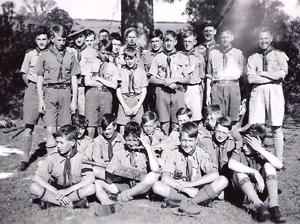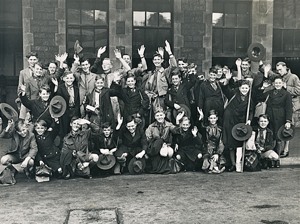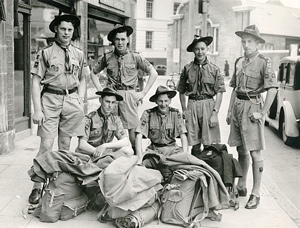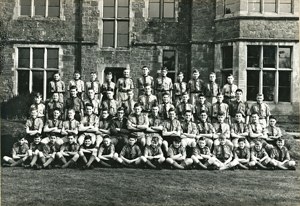
Exeter Stories
Exeter folk and friends in their own words - 1890's to the 1990's │ << Previous story │ Next story >> │
Memories of Hele’s and the 11th Exeter Scout Troop
by Colin Moore
I am not certain that my parents expected me to make it to Hele’s in 1948. I had the perfect excuse as prior to the 11 plus I had suffered scarlet fever and then a burst appendix. Both required long absences from my schools, Cowick Street Primary and John Stocker Junior.
During my first year, after an inept performance on the playing field, the sports teacher Jack Harrison put me in my place, by saying in front of the whole class, that I would not be as good as my brother, who was at the schoo,l and had already gained a reputation for being an outstanding athlete and rugby player. This put me off spor,t although I did play rugby for my School House - Tintagel and achieved its coveted yellow striped tie.
Looking back on those days I still appreciate the school’s extracurricular activities such as the scouts and being an Assistant Librarian. I also enjoyed Morning Assembly - there was something stirring about the singing. Catholics and a scattering of other beliefs, such as Jews, were excused from attending, although periodically they did get visits from their own religious leaders. It was at such an Assembly that I saw the Headmaster Mr A.E Nicholls smile for the first and only time I was at the school . The Music Teacher George Rickard started to play a gramophone record which was supposed to replicate a steel mill starting up. As it developed so the tittering started and ended with us all in fits of laughter.
Recently I was in Southernhay Church, Exeter, where a crowded audience of uniformed scouts of all ages were celebrating their 100th anniversary . Many memories flooded back of my own time with the 11th Exeter (Hele’s School) Scout troop. A Gang Show at the old Theatre Royal, Bob-a-Job weeks, Jamboree at Whipton, camp fires with their ‘sing a longs’, toggle-happy friends and the wearing of outsized pairs of khaki shorts purchased from an ex army shop in Paris Street.
The Swimming Gala
There was also the annual swimming gala in the Heavitree Road Swimming Baths, where all the City’s scout troops would gather, to compete against each. It was always a noisy night with much cheering as the points mounted on the scoreboard. The highlight would always be the underwater event. A number of metal dinner plates would be thrown haphazardly into the pool, and one at a time participants would have to dive in and swim around underwater searching and recovering them. Hele’s invariably won as we had a senior scouter called, if I remember correctly, Matthews, who could stay submerged for minutes with us all shouting and pointing as to where the last two or three plates were. Of course he couldn’t hear or see us but we did get excited.
My first Scoutmaster was ‘Slasher’ Cox. We held our weekly Wednesday night meetings in the school gymnasium learning such skills as knot tying, first aid, semaphore, morse code and how to make plaster casts. The evening always ended with some form of robust game such as the Patrols being split to each end of the gym and then having to get to the other end with the lights turned off. This was accomplished with much noise, scrums and Indignities.
Our Patrols also meet in the Old Stables in the grounds of the then relatively recently acquired Vicarage located behind the school to make our own plans and do our own things. Occasionally at weekends we would sally forth on expeditions on our bikes to such exotic places as Dawlish Warren or Perridge Woods. We were always ‘Prepared’ with neckerchief, compass and sheaf knife.
The Camps
The earliest camps I remember were weekends away at Perridge Woods and Cullompton. The first real camp of any duration was in 1949 on Bryher, on the Isle of Scilly, close to Hell’s Bay. We travelled by train from Exeter to Penzance and boarded the Scillonian, a steam driven ‘bucket’ ship and landed at St Mary’s, and then transferred to a much smaller open boat to get to Bryher followed by a long march across the island carrying all our camping paraphernalia. Our Patrol leader had the great idea of cutting fresh bracken and piling it high on the floor of our ex-army Bell tent and then covering it with our waterproof ground sheets. His belief was that we would all sleep more comfortably. By the following morning we were all covered with tick bites - the dangers of us catching Lyme disease was not even considered - the cure was a quick dip in the sea, painting our spots with pink calomel and shaking out all the clothing and bedding.
We returned again the following year but the camp was washed out in a gale and we ended our holiday undercover in long greenhouses.
That's the Spirit!
In the early 50s my brother and I had access to an abundance of apples and we started making cider, perhaps it was to acquire a Badge in Wine making. Then as a result of a chemistry lesson in which a teacher ‘Eggy’ Eggleton introduced me to the mysteries of the Liebig condenser we hit on the idea to make an apple spirit . We replicated a very Heath Robinson condenser which worked. We had to do it covertly as our parents were staunch Methodists and father a Police officer. We made it one weekend when they were away and kept the resultant liquid in corona bottles at the old stables where it was gradually spooned out to scouters on cold winter’s nights. My other illicit activity at that time was poaching salmon out of the Exwick Leat which was near to where we lived. Like the apple spirit I couldn’t take them home so I sold them at the back door of the Mac Fisheries shop in Wardrew Road, but that's another story.
By 1952 we had acquired a new Scoutmaster, ‘Os’ Larkin,s and off we went to Lake Windermere in the Lake District. It was an idyllic spot and was one of those memorable camps with great weather and plenty of activities. It was memorable for me in more ways than one. We had been invited to visit a Girl Guides camp one evening, to sing songs around their camp fire. It was some distance away and we arrived there hungry, left hungry, and on returning to our camp found ourselves going to bed hungry. I used my initiative and crawled out of our tent and squirmed into the store tent where I found some bread and cheese. I returned with my loot and shared it amongst my fellow scouts. In their eyes I had saved them from starving to death - I was a hero. My sense of euphoria didn’t last long! Unfortunately we got a late visit from ‘Os’ and I had to own up. I was told to parade early next morning with my rucksack packed and to return home to Devon. It meant a long walk to the railway station. It was a hot summer’s day and the rucksack was heavy. I got to the railway station only to find the station master awaiting with instructions that I was to return to the camp immediately. It was an even longer trek back!
Camping at Topsham
‘Os’ then made me the Patrol Leader of the Hawks and I found myself organising a couple of camps at Topsham at the confluence of the Clyst and the Exe rivers. It was a great learning experience, what with the admin, and working out the catering and tenting requirements for over 30 of us. At its commencement two of us canoed from Exwick down the river to the Exeter Canal and then on to the Turf at Topsham. Foolishly we had forgotten to check on the tide tables and found ourselves on the wrong side with a great expanse of mud between us and the camp site. We struggled and slid the canoe eventually arriving covered in mud which could only be removed by being hosed down. The most notable memories of that camp were roasting to perfection a large joint of beef in a make shift oven in a fire pit and visiting the Ferry Boat Inn and buying my first beer.
My last involvement at the school and with scouting was with three others trekking over Dartmoor to gain our Adventurers Badge. This led to ‘Os’ applying for me to become an Assistant Scoutmaster. I regret I didn’t do anymore, as within a month I had left school and begun my career in the police. Some time later I found myself at a crime scene and the senior detective asked those present if there was anyone who knew how to make plaster casts of footprints. I was pleased to volunteer but being a whisky man he didn’t take up my offer to make him apple brandy!
Colin Moore © 2012
Colin Moore is a retired Police Officer. Perridge Woods circa 1949
Perridge Woods circa 1949 1949 St David's Railway Station en route to Isles of Scilly
1949 St David's Railway Station en route to Isles of Scilly 1950 Six new King Scouts off to Windsor to meet the King.
1950 Six new King Scouts off to Windsor to meet the King. Back row - D Peacock, F Kenany, A Wdgewood, R Worth, B Lane, M Sanders, J Chorley, M Stuart, R Arbury, F James, A Downe
Back row - D Peacock, F Kenany, A Wdgewood, R Worth, B Lane, M Sanders, J Chorley, M Stuart, R Arbury, F James, A Downe
3rd row - A Edworthy, M Pullen, R Miles, D Climo, R Huxtable, H Chambers, C Moore, C Bonner, J Rushby, D Steer, C Lentle, J Byrne, D Gillard
2nd row - W Thompson, M Spicer, J Payne, B Moore, R Gillett, J Stoneman, Esq., O S Larkins Esq., J Tilt, K Leaman, H Peters, P Tape, P Williams, J Sayer, T Lovering, D Palmer
Front - R Prout, K Mills, R Clark, C Stansby, M Huxtable, D Perkins, J Wills, D Dunne, R Lemon, R Sharp, V Gibbins, W Burnett, D Johnson, C Drown
│ Top of Page │